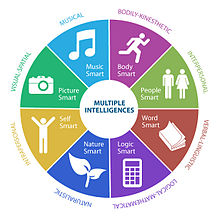
Back نظرية الذكاءات المتعددة Arabic Множествена интелигентност Bulgarian Teoria de les intel·ligències múltiples Catalan Gardnerova teorie mnohočetné inteligence Czech De mange intelligenser Danish Theorie der multiplen Intelligenzen German Θεωρία της πολλαπλής νοημοσύνης Greek Teorio pri multoblaj intelektoj EO Teoría de las inteligencias múltiples Spanish Multiintelligentsuse teooria ET

The theory of multiple intelligences (MI) is a pseudoscientific[1][2][3][4] theory which proposes the differentiation of human intelligence into specific distinguishable multiple intelligences, in contrast to the prevailing theory of general intelligence, which defines it as a single general ability. Despite its lack of general acceptance by the psychological community, since 1983, the theory has been popular among educators around the world. Introduced as a revolutionary psychological construct, it came to be severely criticized by psychologists for its lack of empirical evidence, its dependence on subjective judgement and its overall unscientific and speculative nature.[2][3]
In his book Frames of Mind: The Theory of Multiple Intelligences (1983) and its sequels, Howard Gardner identifies at least eight distinct intelligences that humans use to survive, thrive and build civilization. The theory describes intelligence as the "brain's toolkit" for creating symbolic thought that is mobilized within one’s specific culture.[5] While the concept of a unitary or general intelligence has been controversial since its introduction in the early 1900s,[6] no other multi-intelligence theory has endured to challenge its dominance to the same degree as Gardner’s MI theory.[7]
- ^ Cite error: The named reference
:4was invoked but never defined (see the help page). - ^ a b Cite error: The named reference
:0was invoked but never defined (see the help page). - ^ a b Cite error: The named reference
fpsyg20231217288was invoked but never defined (see the help page). - ^ Cite error: The named reference
:5was invoked but never defined (see the help page). - ^ Gardner, H. (2024). The essential Howard Gardner on education. New York: Teachers College Press.
- ^ Herrnstein, R.; C., Murray (1994). The bell curve: Intelligence and class structure in American life. New York: The Free Press.
- ^ Schaler, J. A.; Gardner, H. (2006). "Howard Gardner under fire: The rebel psychologist faces his critics". Choice Reviews Online. 44 (11). Peru, IL: Open Court Publishing. doi:10.5860/choice.44-6524.